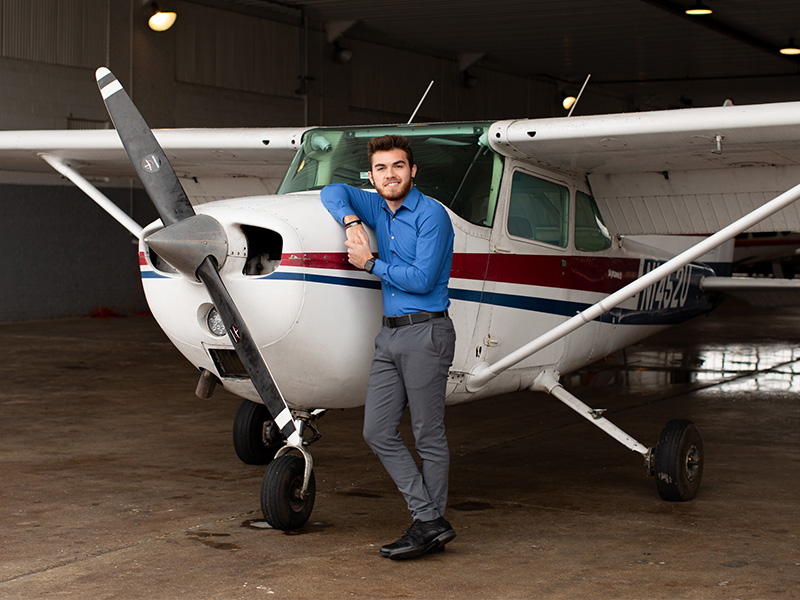Edinboro
PennWest Associate of Science in Aeronautics helps students find their wings
The program works with 141 FAA-approved flight schools

PennWest Edinboro has partnered with 141 FAA-approved flight schools on an accelerated 60-credit program that allows students to complete academic coursework online, as well as complete between 225 and 250 flight hours, in about two years. Upon completion, graduates will be prepared for a job as a commercial industry pilot (non-passenger), a private charter pilot or a flight instructor.
Additionally, when students complete flight training at High Flight Academy in Butler (one of Edinboro’s flight school partners), they can be hired as paid flight instructors for the next generation of pilots. This helps them gain additional flight hours to become airline transport or cargo pilots. The program, housed under Edinboro’s physics department, also fuels the flight industry, which needs pilots.
In Technician Outlook, Boeing estimates that more than 600,000 pilots will be needed over the next two decades – which was good news for Nick Fritz, who has wanted to fly since he was 8 years old.
Couple that with his interest in truck driving, and Fritz is on his way to becoming a cargo pilot. Through research, Fritz discovered the PennWest Edinboro program has many advantages, including that in addition to an A.S. degree, he could also achieve a Bachelor of Science in applied technical leadership.
Unlike Fritz, Nathaniel Webb was well into his college career, but he was without a future plan until he discovered the aeronautical science program.
“I wanted to find something exciting,” Webb said.
Webb, who had an interest in flying, was fully on board when he discovered that most of his credits would transfer into the A.S. program and that the program’s coursework is completely online.
Another major factor in Webb’s decision was easy access to financial aid. Flight programs require access to planes, plus fuel and maintenance to fly them; costs add up quickly.
Loan institutions believe becoming a pilot is a good return on investment, said Korey Kilburn, Ph.D., advisor and developer of the Edinboro aeronautics program.
Once students complete training, well-paying job offers are typical; pilots eventually make six figures, according to the Department of Labor and Industry.
“You get a good-paying job at a young age. You can hit the ground running,” said Chris Hayden, chief instructor at High Flight Academy, where Fritz, Webb and fellow student Preston Sears are gaining their flight training and experience.
Choosing Edinboro and High Flight put Sears in the cockpit sooner than other aeronautics programs. Sears knew he wanted to fly, but he had no idea how much he would grow to love it once he stepped inside the cockpit.
“I didn’t realize it was going to be so fun,” Sears said.
High Flight works to make certain its students get experience both in the full motion simulator and in the air. Gaining the necessary flight time can be problematic at other flight schools, but High Flight has 12 airplanes in its hangar and is looking to buy another, Hayden said.
Accessible planes make it easier to gain crucial flight hours. In order to complete a part of the 141 pilot program, the FAA requires a student to log a minimum of 190 hours of flight time. Sears is looking forward to becoming a trainer to log additional flight hours required to become a commercial or cargo pilot. He’s logged many of his hours with Joe Dornetta, who has been a trainer for four months.
“I never walk away from here in a bad mood,” Dornetta said as he coached Sears in a Cessna 172 on a cloudy afternoon.
The exhilaration of flight is part of the fun that Sears, Webb and Fritz have found.
“I really want to fly,” Sears said.